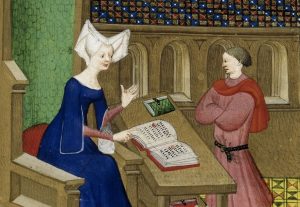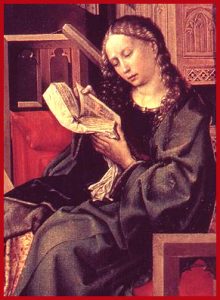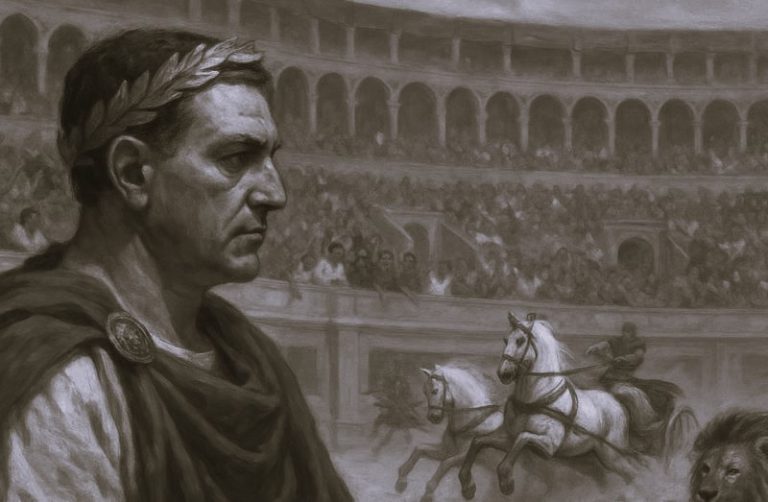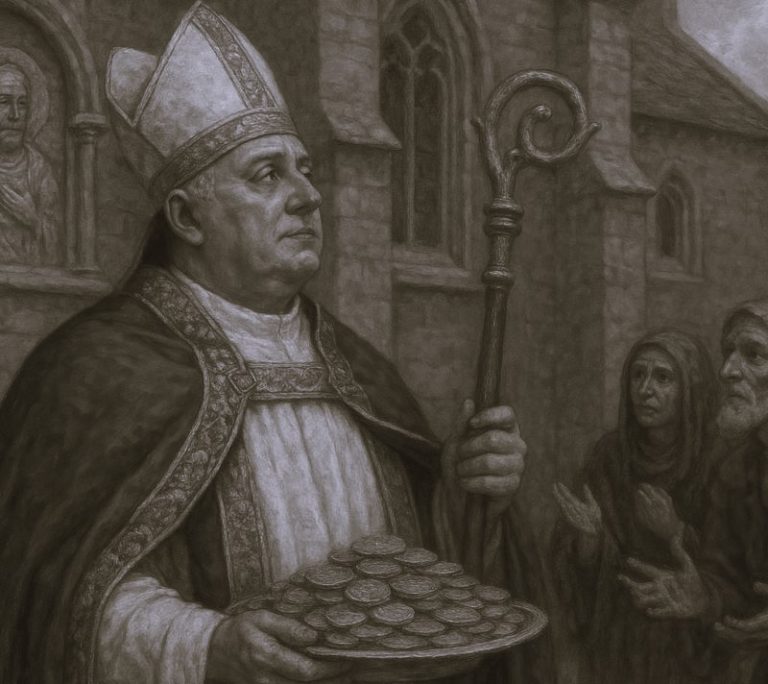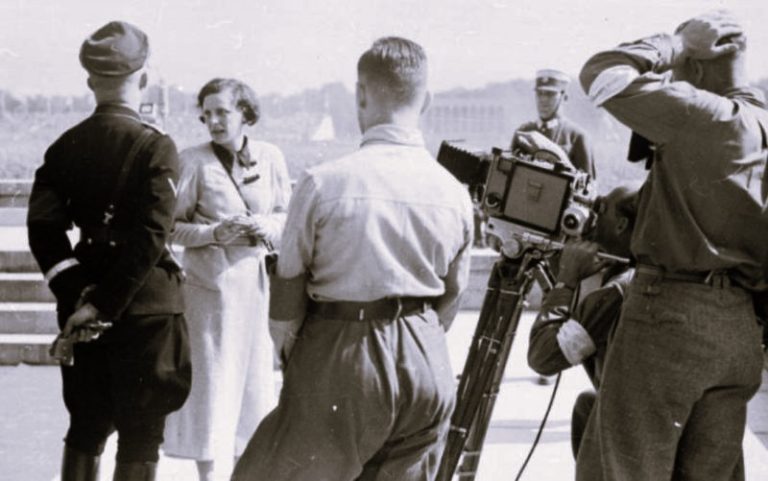Wikimedia Commons
By Matthew A. McIntosh
Brewminate Editor-in-Chief
The Carolingian period in the late eighth and ninth centuries served as a pivotal moment in Western Europe. The Western Roman Empire was no more, and the chaos and continued fighting that followed its dissolution as the church asserted its authority would climax in yet another empire under Charlemagne with the exclusion of England, Spain and southern Italy. A new system of government and administration was adopted and expanded, and it was economically driven by the emergence of feudalism prior to the Carolingians and their further development of it.[1] After his reign, the empire was divided among his sons in yet another imperial dissolution that would lead a limited number of lay intellectuals to address it with exasperation and advice. Dhuoda was well-educated and well-read as one of those few,[2] and this is the construct in which she found herself separated from her children but retaining a deep desire to nurture them with advice. She knew what it would take for her son, William, to succeed in a new type of feudal aristocracy, and in her Liber Manualis she displayed a clear understanding of the political reality in which he would grow – a reality which was well defined by William’s status as a hostage in the court of Charles the Bald at the time of her writing.[3] Her advice was laden with insight on the three primary facets of the Carolingian world –the king and aristocracy, their vassals, and the church – and she used these as a framework for her son.
The feudal economic system and political oaths of fealty were started by and grew under the Merovingians but largely vanished through the course of the seventh century. After Hadrad’s revolt in 786 CE, Charlemagne reinstituted the practice in which all would pledge their loyalty to him on their honor in the name of God.[4] Dhuoda exhorted William to place his obedience and support in a hierarchical manner in line with that system with God at the top, the “…kings and all those of highest rank…,” his immediate lord, and in keeping with what was a heavily patriarchal society[5], his father.[6] Dhuoda followed this sense of structure and order not only in reference to how the religio-political system functioned but in her organization of the advice she provided to her son, even giving him instructions in verse to follow the guide by the organized headings she provided.[7] She shifted between nurturing mother and diligent teacher throughout the guide, providing an analysis of what would be important in his life with step-by-step approaches to prayer and secular education in Books Eight and Nine. She indicated that the characteristics she encouraged William to develop and diligently maintain be learned by example from those in authority,[8] and she outlined these throughout the guide as she wrote of morality, virtue, honor and courage. The greatest points of character she again provided with Scripture – faith, hope, and charity.[9] She believed in kings and magnates, as well as fathers, who led by example and kept their obligations to their subjects as they expected in return. Such was the very nature of an oath of fealty.
Image of Dhuoda writing to her fifteen-year-old son: “I urge you to be a perfect man. … And I would show you how to become such a man with God’s help.” / Wikimedia Commons
Dhuoda did not limit her discussion to the characteristics of good leadership. She knew that William’s destiny would at most be that of a magnate and that he would always be in service to someone else.[10] Much of her writing was devoted to teaching William how to be a good follower – a rightful servant. The Carolingian political and social system was based on obligations from top to bottom and bottom to top. She was adamant that William follow the examples of his superiors and yield to them accordingly. [11] She consistently referred to herself as generally unimportant and admonished William in the same manner, reminding him that they were “…not among the number of the great…”[12] This was quite likely a pretense of weakness for the sake of humility. Dhuoda would almost certainly have known of the Carolingian practice of taking as much bounty as possible from those they conquered and establishing regular due tribute, which was not unique to them in the history of imperial conquests. But just as the ancient Romans expected paneres et circenses, this had no more faded from public memory than had that Roman ideal. Either she was completely unaware that riches were now hoarded by the king with very little given to even those most in need in his own realm[13] or she was nevertheless exhorting her son to rise above such moral want. This seems to indicate a belief that a good vassal would hold true to his obligation even if his lord or king did not. Humble in her writing, she expected the same of her son. It was upon such humility that their true strength was founded in spite of their present station. Dhuoda did not write her guide as a weak woman for a similarly weak son but as a woman rising above her society’s view that she would not be capable of such intellectual pursuits and encouraging her son that true respect, even for vassals, was gained in this way.[14] Kings retained power in the Carolingian construct by providing a type of medieval cursus honorum for aristocrats in their localities. Dhuoda may well have been encouraging her son to maintain humility and sense of service not only to be a pious man but also one with at least limited power, knowing that that such titles were as easily removed as bestowed.[15]
The church and Dhuoda’s faith by far exceed all other topics in her handbook and remained consistently part of its substructure. The advice she provided was given a solid foundation by her knowledge of Scripture, which she cited numerous times, and other scholars and thinkers before and during her time. She donned the hat of teacher in explaining to William the structure of the church and its authority, which she saw as all-encompassing in writing, “Bishops, after the model of the true and sublime Lord, are the bearers of authority above, below, within and outside.”[16] Dhuoda lived in a world that no longer combined the sacred and secular into a single person or body but separated the two with the sacred above. The days of ruler apotheosis were long past, and kings like everyone else were bound to the same spiritual code and obligations. Bishops and priests, as earthly intermediaries with the divine, were held in higher regard. She made it clear that “…firm belief in Christ” and governing with a peaceful hand was necessary even for kings to “…eventually reach the heavenly kingdom.”[17] The church’s power had become so absolute that even rulers would recognize a higher authority on bent Theodosian knees. The Carolingian structure reached back to Rome only symbolically as it coalesced control of Western Europe into a single entity governed by a king who ruled with the blessing of the pontifex maximus. Charlemagne was reported to have said that he would not have attended his coronation in 800 CE had he known that the pope would be in attendance to crown him. He knew this would symbolically deflate any view of him as supreme, as it did with his title of Holy Roman Emperor.[18] As a king’s magnates swore oaths of fidelity to him he likewise did on the papal ring.
A structured and powerful Christian church had emerged by the eighth and ninth centuries, and though there were still conflicts surrounding secular authority, the church was popularly accepted as vastly more important. This was evident in Dhuoda’s Liberis Manualis to her son. Its early beginnings and rise to prominence was initially based upon its appeal to the less affluent in society. The “common people” were as drawn in Dhuoda’s time as they always had been, and their own doctrine combined with influential church teachings encouraged steadfast service to “render unto Caesar” not merely economically but socially and politically as well. But the relationship between ruler and ruled had become bilaterally obligatory. Kings and lords owed protection and stability in return for that faithful service, and they were expected to render due diligence to the church. A thorough reading of Dhuoda with an understanding of her insight into the teachings of others and her independent educated knowledge of the Scriptures themselves yields the picture of a woman attempting to leave for her son the best advice that would position him for success. Had he taken it, he may have survived past the young age of twenty-three.
REFERENCES
[1] Dale Evva Gelfand, Charlemagne (Philadelphia: Chelsea House Publishers, 2003), 65.
[2] Janet L. Nelson, “Dhuoda,” in Lay Intellectuals in the Carolingian World, Patrick Wormald and Janet L. Nelson, eds. (Cambridge: Cambridge University Press, 2007), 108.
[3] Marie Anne Mayeski, Women: Models of Liberation (Kansas City, MO: Sheed & Ward, 1988), 32.
[4] Charles E. Odegaard, “Carolingian Oaths of Fidelity,” Speculum 16:3 (July 1941), 284.
[5] Rosamond McKitterick, Charlemagne: The Formation of a European Identity (Cambridge: Cambridge University Press, 2008), 93.
[6] Dhuoda, Handbook for William: A Carolingian Woman’s Counsel for Her Son 8.4-7 (Washington, D.C.: Catholic University Press), 37.
[7] Dhuoda, 10.7, 72.
[8] Dhuoda, 3.10, 30.
[9] Dhuoda, 2.2, 9-10.
[10] Dhuoda, 3.5, 25.
[11] Dhuoda, 3.10, 30.
[12] Dhuoda 4.1, 40.
[13] Timothy Reuter, “Plunder and Tribute in the Carolingian Empire,” Transactions of the Royal Historical Society 5:35 (1985), 80.
[14] Marie Anne Mayeski, Dhuoda: Ninth Century Mother and Theologian (Scranton: University of Scranton Press, 1995), 22.
[15] Matthew Innes, State and Society in the Early Middle Ages: The Middle Rhine Valley, 400-1000 (Cambridge: Cambridge University Press, 2000), 262.
[16] Dhuoda, 3.11, 38.
[17] Dhuoda, 8.5, 74.
[18] McKitterick, 4.

